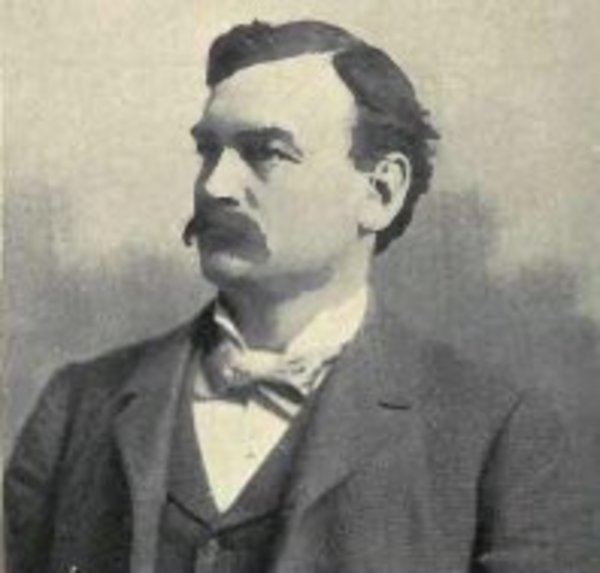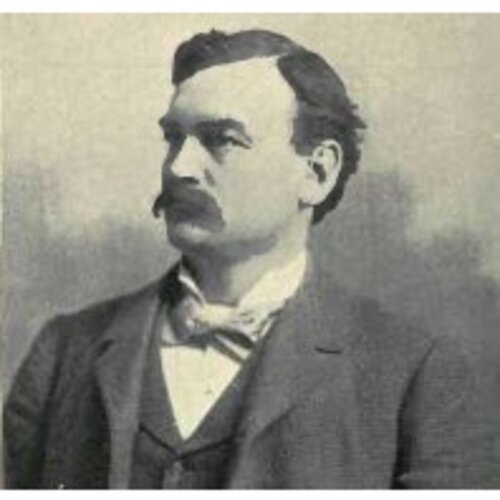
Source: Courtesy of Wikimedia Commons
RICHARDSON, ROBERT LORNE, journalist, newspaper owner and editor, politician, and author; b. 28 June 1860 near Balderson, Upper Canada, son of Joseph Richardson and Harriet Thompson; m. 11 March 1885, in Brockville, Ont., Clara Jane Mallory of Mallorytown, Ont., and they had five daughters, one of whom predeceased him; d. 6 Nov. 1921 in Winnipeg.
The youngest of seven children of a Scottish Presbyterian farmer, Robert Lorne Richardson began life on a rural Ontario farm. He attended school in Balderson and at age 17 followed his second eldest brother to Montreal, where in 1879 he began a career in journalism with the Montreal Daily Star. In 1881 he joined the editorial staff of the Toronto Globe; he worked there for a year before moving to Winnipeg to participate in the Sun’s transformation into a daily paper.
Richardson held the position of city editor with the Daily Sun until December 1889, when the paper was bought by the Manitoba Free Press; the Sun stopped publication in mid January 1890. With his childhood friend Duncan Lloyd McIntyre, he purchased the Sun’s presses and founded the Winnipeg Daily Tribune, which began publication in January 1890 as an independent paper, but with the backing of the Liberal party. In June 1903 it would become the Winnipeg Tribune and in January 1915, the Evening Tribune. As its publisher and editor, Richardson would advocate free trade, government-owned railways, and the abolition of separate schools, increasingly deviating from Liberal policy.
In 1896 Richardson entered politics as the Liberal candidate in the federal riding of Lisgar and he won election on a platform advocating a limited tariff, “for revenue only.” Although appointed a government whip, he soon ran foul of his party for opposing the compromise between Prime Minister Wilfrid Laurier* and Manitoba premier Thomas Greenway* on the Manitoba school question. His attacks on the Laurier government’s administration of the Yukon and his opposition to the Canadian Pacific Railway soon earned him the enmity of Laurier’s western lieutenant, Clifford Sifton. In 1897–98 Sifton had orchestrated the purchase of the Free Press and had transformed it into an influential Liberal organ. Richardson waged an ongoing battle with the Free Press.
Ousted from the Liberal caucus for his insubordination, Richardson ran for re-election in 1900 as an independent; he retained his seat with the help of the Manitoba Conservatives, who backed him in return for the Tribune’s support. When, early in 1901, the Tribune rashly denounced the railway policy of Conservative premier Rodmond Palen Roblin*, the Tories made public details of electoral improprieties committed by Richardson’s agents, including the bribing of voters and distribution of alcohol at the polls. Sifton personally absorbed the cost of Richardson’s prosecution for these offences. The court annulled Richardson’s election in July 1901.
For the remainder of his political career Richardson continued to vacillate in his allegiance. In 1902, after unsuccessfully contesting, as an independent Liberal, the by-election in Lisgar caused by the annulment of his election, he joined other Winnipeg independents to create a short-lived party, the Political Reform Union. As an independent, he lost in Brandon to Sifton in the federal general election of 1904. Sifton had had the constituency’s boundaries redrawn to carve up Richardson’s base of support. Richardson then campaigned unsuccessfully as a Liberal candidate in Killarney in the Manitoba election of 1907, as an independent Conservative in the Saskatchewan riding of Assiniboia in the federal election of 1908, and as an independent Liberal in a federal by-election in 1912 in Macdonald, a Manitoba constituency. He was finally returned to the House of Commons in 1917 as the radical candidate in Springfield, where he had campaigned in favour of conscription.
Richardson was the author of two novels on rural Ontario life, Colin of the ninth concession: a tale of pioneer life in eastern Ontario (Toronto, 1903) and The Camerons of Bruce (Toronto, 1906), both of which had large Canadian sales. One of his most lasting contributions in journalism had been his participation in the founding in 1907 of the Western Associated Press, a cooperative news service, the precursor of the Canadian Press Limited [see John Ross Robertson*]. In the spring of 1920 he sold the Tribune. He died the next year, following a lengthy illness.
Described by his friend D. L. McIntyre as a man who “refused to allow party or partisan considerations to influence his conduct,” Robert Lorne Richardson had cast himself as a populist and a spokesperson for western disaffection. His influence as a politician was blunted, however, by his continually shifting allegiances and by his penchant for placing self-interest ahead of principle. His contribution as a newspaperman – as a central figure in the battle between the Tribune and the Free Press and in the development of Canadian syndicated news – far outweighed anything he accomplished in the political arena.
In addition to the novels mentioned in the biography, Robert Lorne Richardson wrote several brochures about the Canadian west. A list of these is in CIHM, Reg.
AM, GR 1662. AO, F 373; RG 80-5-0-135, no.6544. LAC, MG 26, G. Winnipeg Tribune, 1890–1921. Canadian annual rev., 1900–29. Canadian men and women of the time (Morgan; 1898 and 1912). Ramsay Cook, The politics of John W. Dafoe and the “Free Press” (Toronto and Buffalo, N.Y., 1963). CPG, 1896–1919. D. J. Hall, Clifford Sifton (2v., Vancouver and London, 1981–85). M. E. Nichols, (CP): the story of the Canadian Press (Toronto, 1948). F. H. Schofield, The story of Manitoba (3v., Winnipeg, 1913).
Cite This Article
Thomas G. Boreskie, “RICHARDSON, ROBERT LORNE,” in Dictionary of Canadian Biography, vol. 15, University of Toronto/Université Laval, 2003–, accessed December 27, 2025, https://www.biographi.ca/en/bio/richardson_robert_lorne_15E.html.
The citation above shows the format for footnotes and endnotes according to the Chicago manual of style (16th edition). Information to be used in other citation formats:
| Permalink: | https://www.biographi.ca/en/bio/richardson_robert_lorne_15E.html |
| Author of Article: | Thomas G. Boreskie |
| Title of Article: | RICHARDSON, ROBERT LORNE |
| Publication Name: | Dictionary of Canadian Biography, vol. 15 |
| Publisher: | University of Toronto/Université Laval |
| Year of publication: | 2005 |
| Year of revision: | 2005 |
| Access Date: | December 27, 2025 |



